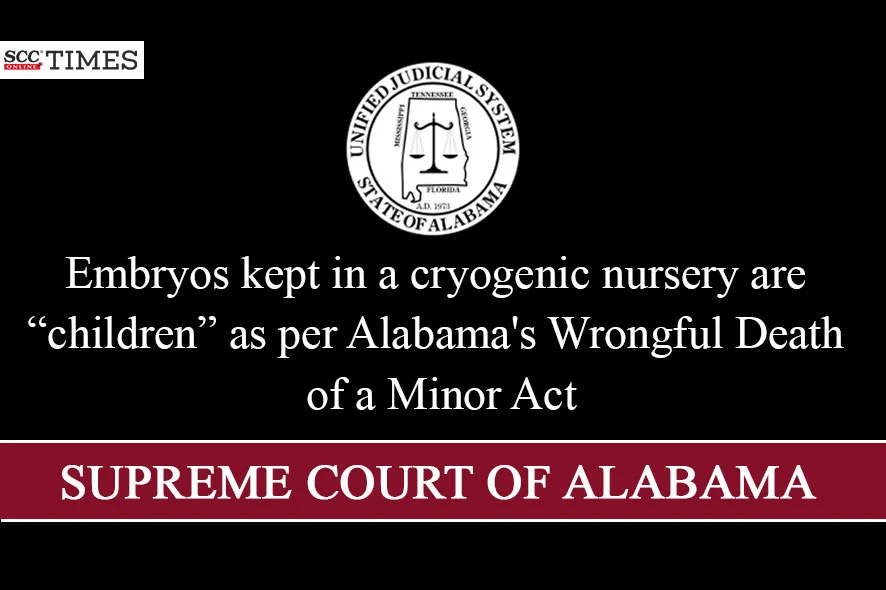Supreme Court of Alabama: While considering the instant issue that whether embryos kept in a cryogenic nursery, forms an exception to the definition of “children” as per Alabama’s Wrongful Death of a Minor Act, § 6-5-391, Ala. Code 1975; Jay Mitchell, J., delivered the majority opinion stating that under existing black-letter law, the Wrongful Death of a Minor Act applies to all unborn children, regardless of their location.
Background: Plaintiffs in these consolidated appeals are the parents of several embryonic children, each of whom were created through in vitro fertilization (“IVF”) and had been kept alive in a cryogenic nursery while they awaited implantation.
Between 2013 and 2016, each set of parents went to a fertility clinic operated by the Centre for Reproductive Medicine, P.C. During those treatments, doctors were able to help the plaintiffs conceive children by joining the mother’s eggs and the father’s sperm “in vitro”- i.e., outside the mother’s body. The Centre artificially gestated each embryo and then placed the embryos in the Centre’s cryogenic nursery, which is a facility designed to keep extrauterine embryos alive at a fixed stage of development by preserving them at an extremely low temperature.
However, in December 2020, a patient at the Hospital managed to wander into the Centre’s fertility clinic through an unsecured doorway. The patient then entered the cryogenic nursery and removed several embryos. The subzero temperatures at which the embryos had been stored freeze-burned the patient’s hand, causing the patient to drop the embryos on the floor, killing them.
The plaintiffs alleged that the Centre was obligated to keep the cryogenic nursery secured and monitored at all times.
The defendants contended that the Court should recognize frozen embryos as an exception because, an unborn child ceases to qualify as a “child or “person” if that child is not contained within a biological womb.
Issue Before the Court: Whether the Alabama’s Wrongful Death of a Minor Act contains an unwritten exception to that rule for extrauterine children — that is, unborn children who are located outside of a biological uterus at the time they are killed.
Court’s Assessment: While perusing the matter, the Court clarified it is not addressing the difficult questions about the ethical status of extrauterine children, the application of the 14th Amendment to the United States Constitution to such children, and the public-policy implications of treating extra-uterine children as human beings.
While determining the issue at hand, the Court referred to several judicial precedents to clarify that there is no dispute that an unborn child qualifies as a “minor child” under the Wrongful Death of a Minor Act, regardless of that child’s viability or stage of development.
Tracing the history of Wrongful Death of a Minor Act, the Court stated that the leading dictionary in 1872 defined the word “child” as “the immediate progeny of parents” and indicated that this term encompassed children in the womb.
It was noted that even if the word “child” was ambiguous, however, the Alabama Constitution would require courts to resolve the ambiguity in favour of protecting unborn life. It was stated that Courts interpreting statutes are required to give words their natural, ordinary, commonly understood meaning, unless there is some textual indication that an unusual or technical meaning applies.
Taking note of the dictionary meaning of “minor child”, the Court interpreted that phrase “minor child” means the same thing in the Wrongful Death of a Minor Act as it does in everyday parlance: “an unborn or recently born” individual member of the human species, from fertilization until the age of majority”.
It was further pointed out that nothing about the Wrongful Death of a Minor Act narrows that definition to unborn children who are physically “in utero.” Instead, the Act provides a cause of action for the death of any “minor child,” without exception or limitation.
It was pointed out that the Court’s precedents do not compel the creation of an unwritten exception for extra-uterine children.
Rejecting the defendant’s contention that treating extrauterine children as “children” for purposes of wrongful-death liability will “substantially increase the cost of IVF in Alabama” and could make cryogenic preservation onerous, the Court noted that the text of the Wrongful Death of a Minor Act is sweeping and unqualified. It applies to all children, born and unborn, without limitation. “It is not the role of this Court to craft a new limitation based on our own view of what is or is not wise public policy”.
Dissenting Opinion: Greg Cook, J., expressed his dissent stating that by expanding the meaning of the Wrongful Death Act beyond what it meant in 1872 without an amendment by the Legislature, the majority violated the fundamental principle of Separation of Powers as it is responsibility of the Legislature to make and update the laws.
He pointed out that Court is in the judicial branch, its role is limited, and applying the “original public meaning” of the words in a statute helps the Court to stay within its constitutional role, which is a fundamental part of democracy. “When government-adopted texts are given a new meaning, the law is changed; and changing written law, like adopting written law in the first place, is the function of Legislature and Executive”.
[James LePage v. The Center for Reproductive Medicine, P.C., SC-2022-0515, 20-02-2024]
Image Source: https://en.wikipedia.org/wiki/Supreme_Court_of_Alabama






